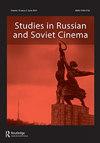‘One foot in the grave’: pregnancy and folk culture in recent Russian films
IF 0.1
0 FILM, RADIO, TELEVISION
引用次数: 2
Abstract
ABSTRACT This article focuses on two recent Russian films – Vasilii Sigarev’s Living (2012) and Natasha Merkulova and Aleksei Chupov’s The Man who Surprised Everyone (2018) – that exploit the multivalent potential of the pregnant body. Both films enlist the symbolism with which Russian traditional culture has infused that body to create complex, nuanced cinematic depictions of the porousness between the realm of the living and that of the dead. The folk symbolism of pregnancy facilitates the directors’ subtle critiques of contemporary Russian society, including its cynicism; casual, ubiquitous violence; and rigid gender hierarchies. These films highlight the pregnant woman’s destabilising potential, one that challenges the Russian state’s increasingly fervent incursion into the intimate realm separating life and death. They also prompt us to recall that feminist thinkers have turned to the pregnant body as a source of insight. With her challenge to the notion of a singular, unified body, the pregnant woman points to new philosophical models of the self – possibilities that have yet to be explored fully on screen, but towards which the two contemporary Russian films discussed in this essay may point.“一只脚在坟墓里”:最近俄罗斯电影中的怀孕和民间文化
摘要本文聚焦于最近的两部俄罗斯电影——瓦西里·西加列夫的《活着》(2012年)、娜塔莎·梅尔库洛娃和阿列克谢·丘波夫的《让所有人都惊讶的男人》(2018年)——这两部电影挖掘了孕体的多元潜力。这两部电影都采用了俄罗斯传统文化赋予身体的象征意义,对活人和死人之间的多孔性进行了复杂、细致的电影描绘。怀孕的民间象征促进了导演对当代俄罗斯社会的微妙批判,包括其犬儒主义;随意的、无处不在的暴力;以及严格的性别等级制度。这些电影突出了孕妇破坏稳定的潜力,这挑战了俄罗斯政府对生死分离的亲密领域日益狂热的入侵。它们也促使我们回忆起,女权主义思想家已经将怀孕的身体作为洞察力的来源。这位孕妇对一个单一、统一的身体的概念提出了挑战,她指出了自我的新哲学模式——这些可能性尚未在银幕上得到充分探索,但本文讨论的两部当代俄罗斯电影可能会指向这些可能性。
本文章由计算机程序翻译,如有差异,请以英文原文为准。
求助全文
约1分钟内获得全文
求助全文

 求助内容:
求助内容: 应助结果提醒方式:
应助结果提醒方式:


